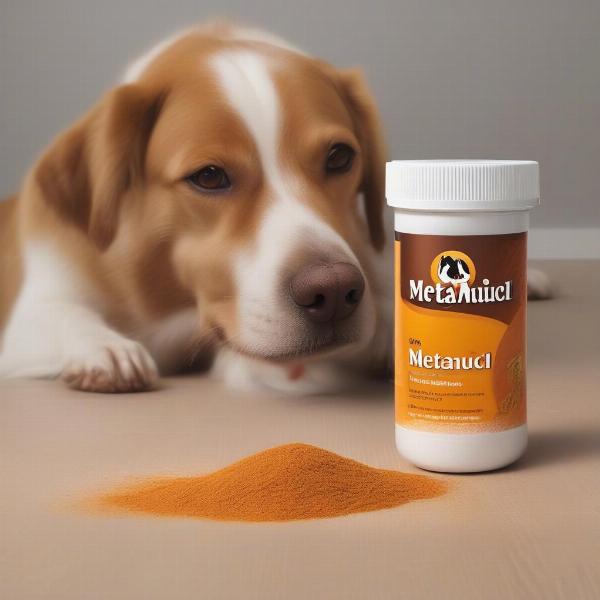Metamucil, a common fiber supplement for humans, is sometimes considered for dogs experiencing digestive issues. But how much Metamucil for dogs is safe and effective? This article will delve into the appropriate usage of Metamucil for dogs, including dosage guidelines, potential benefits and risks, and when to consult a veterinarian. We’ll explore how fiber supplements can support your dog’s digestive health and help you make informed decisions about their care.
Metamucil’s main ingredient, psyllium husk, is a soluble fiber that absorbs water in the digestive tract, forming a gel-like substance. This can help regulate bowel movements, alleviate constipation, and manage diarrhea in both humans and dogs. However, it’s crucial to remember that dogs’ digestive systems differ from ours, so consulting your veterinarian before administering Metamucil is essential. They can determine if it’s appropriate for your dog’s specific condition and advise on the correct dosage. Never self-treat your dog with human medications.
Understanding Metamucil and Its Uses in Dogs
Metamucil can be beneficial for dogs experiencing certain digestive problems, such as constipation or diarrhea. The added fiber can bulk up the stool, making it easier to pass in cases of constipation. Conversely, it can absorb excess water in the intestines, helping to firm up loose stools associated with diarrhea. However, it’s important to note that Metamucil is not a cure-all and shouldn’t be used as a replacement for veterinary care.
 Metamucil for Dogs with Constipation
Metamucil for Dogs with Constipation
How Much Metamucil Can I Give My Dog?
Determining the right dosage of Metamucil for your dog depends on their size, weight, and the specific condition being addressed. Generally, the recommended dosage is 1/4 to 1 teaspoon of Metamucil powder mixed with food per day for small dogs, and 1 to 2 teaspoons per day for larger dogs. It’s crucial to start with a small dose and gradually increase it as needed, monitoring your dog’s response. Always mix the powder thoroughly with wet food or water to ensure your dog ingests it properly and prevent choking.
Potential Benefits and Risks of Metamucil for Dogs
While Metamucil can be helpful for some dogs, it’s important to be aware of potential risks. Giving too much Metamucil can lead to gas, bloating, and abdominal discomfort. In some cases, it can also worsen diarrhea or cause dehydration if not administered with sufficient water.
When to Consult a Veterinarian
If your dog is experiencing persistent digestive issues, it’s essential to consult a veterinarian. They can diagnose the underlying cause of the problem and recommend the most appropriate treatment plan, which may or may not include Metamucil. Never give Metamucil to a dog with a known bowel obstruction or megacolon without veterinary guidance.
Is Metamucil Safe for All Dogs?
While generally safe, Metamucil may not be suitable for all dogs. Dogs with certain medical conditions, such as diabetes, kidney disease, or heart problems, should only be given Metamucil under strict veterinary supervision.
Can Metamucil Help with Hairballs?
While primarily used for regulating bowel movements, some pet owners believe that the added fiber in Metamucil can help move hairballs through the digestive tract. However, more research is needed to confirm this.
How long can I give my dog Metamucil?
Metamucil can be used short-term to manage acute episodes of constipation or diarrhea. For long-term use, consult your veterinarian to determine the appropriate duration and dosage.
Conclusion
Metamucil can be a helpful tool for managing certain digestive issues in dogs, but it’s crucial to use it responsibly. Always consult your veterinarian before administering Metamucil to your dog, and follow their guidance on dosage and usage. Careful monitoring and proper administration can help ensure your dog receives the benefits of this fiber supplement while minimizing potential risks.
FAQs
- How do I give my dog Metamucil? Mix the recommended dosage of Metamucil powder thoroughly with your dog’s wet food or water.
- What are the signs of Metamucil overdose in dogs? Signs of overdose can include severe diarrhea, vomiting, lethargy, and dehydration.
- Can I give my dog Metamucil every day? Consult your veterinarian for advice on long-term use.
- Are there any alternatives to Metamucil for dogs? Other fiber supplements and dietary changes can also help with digestive issues. Your veterinarian can recommend the best option for your dog.
- Can Metamucil help with anal gland problems? While some believe it can, it’s not a proven treatment for anal gland issues.
- What should I do if my dog doesn’t like the taste of Metamucil? Try mixing it with a small amount of highly palatable food or using a flavorless version.
- Can Metamucil interact with other medications my dog is taking? It’s possible. Always inform your veterinarian about all medications and supplements your dog is receiving.
ILM Dog is your trusted source for comprehensive information on dog care, offering expert advice on breeds, health, training, nutrition, grooming, and much more. From puppy care to senior dog support, we provide practical tips and valuable resources for dog owners worldwide. ILM Dog offers a wealth of knowledge to help you navigate every aspect of dog ownership. Contact us for personalized guidance and support. Email: [email protected], Phone: +44 20-3965-8624.